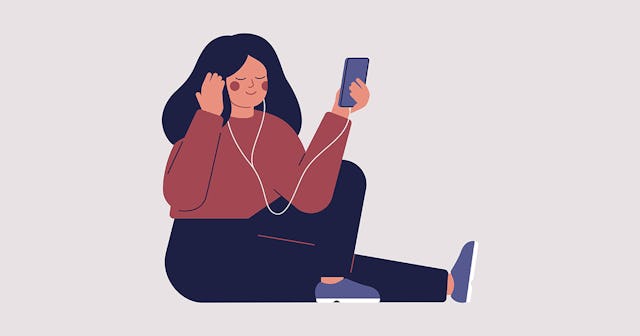Audiobooks Are An Essential Part Of My Self-Care

My favorite childhood memories involve books. I can still smell the local used book store I went to so that I could pick out Berenstain Bears titles and then as many books as I could find in the Baby-Sitters Club series. As I got older, my go-tos were R.L. Stine, John Steinbeck, and S.E. Hinton. I was an angsty, lost-in-the-deep-thoughts-of-my-brain tween and teenager, okay? When I wasn’t busting ass to get straight A’s, working part-time, playing a varsity sport, and hiding the fact that I was queer, I was lost in a book. They were welcome escapes from my rough childhood home and from the stress of being in a constant state of hustle. Without consciously doing it, I was using books as a way to self-soothe and reset. Books are still part of my self-care, but they are now in the form of audiobooks.
Unlike when I was 15, I can’t stay awake to read until 3:00 a.m. I fully blame my three children; they’re wonderful, but they’re exhausting AF. I fall asleep after a few paragraphs into the book I have been daydreaming about and then startle awake hours later to turn off the light. I never manage to get through a book or have a good night’s sleep. I have stacks of hopeful offerings on my nightstand and on a bookshelf, but the only time I read a physical book is when I’m on the toilet. And even then I’m usually interrupted by one of my children — have kids, they said.
My oldest daughter is now the one sprawled out on the couch or bent over a book at the kitchen table and reading page after page while I enviously long for the day when I can once again read without the weight of obligation or heavy eyelids.
I love listening to podcasts while prepping dinner, working out, or during work when tasks can be done on auto-pilot. They are the distraction and entertainment I need to keep myself moving and informed. But they don’t offer the same level of escape and entertainment as a full-length book. I was craving a way to dissociate from reality in a safe and affordable way that won’t put me to sleep. Enter Libby.
The Libby app by OverDrive allows library card holders access to audio and ebooks from their public library and it’s free. Audiobooks aren’t new, but I never kept a service beyond the free trial because of the fees attached. Thanks to Libby, I have consumed 42 books since March, and I am once again finding joy and comfort in the self-care act of getting lost in book.
Clinical psychologist Caitlin Sopp says, “When you’re absorbed in a good book, you’re not worried about what happened earlier in the day, you’re not stressing about what’s coming the next day. Reading is a form of mindfulness.” You are turning off your brain in a way that allows it to rest and let in creativity and reflection. If you are part of a book club you also get the benefit of social interaction and connection — both of which are good for mental health and emotional well-being.
I have always been a self-aware person, but I had been missing the ability to self-reflect and have my ideas challenged or expanded by a book. Both non-fiction and fictional titles allow me to do this. I saw myself in Jenny Lawson’s Broken. I realized how panicked I am about time and what I want out of this life in V.E. Schawb’s The Invisible Life of Addie LaRue. I learned about people’s struggles that are greater than my own while listening to Isabele Wilkerson’s Caste and Suki Kim’s Without You, There Is No Us. I confirmed other’s biases and validated my identity in Alok Vaid-Menon’s Beyond the Gender Binary while I challenged my own biases and way of thinking in Adam Grant’s Think Again: The Power of Knowing What You Don’t Know. And because I love a good love story with obstacles and taboo foundations, I binged Stephenie Meyer’s world of vampires and werewolves in her Twilight saga.
Audiobooks make me feel better because they reduce my anxiety and improve my mood, but listening to stories taps into the powerful and very old form of storytelling that was used to teach lessons and pass on family history or historical truths. Listening to stories is a very primal comfort that has been used for thousands of years.
Fables, parables, nursery rhymes, and fairy tales are entertaining and enlightening — even if far-fetched at times. But we continue to find truth and meaning within stories whether we turn them into the version of truth and understanding we need or unpack all we thought we knew and learn something different. Sufi author Idries Shah writes, “Most fables contain at least some truth, and they often enable people to absorb ideas which the ordinary patterns of their thinking would prevent them from digesting.”
Reading books, but specifically listening to someone read the book to me, gets me out of my own head. It helps me connect to other emotions that exist in my body and to other people and their experiences. Listening to books reminds me that the world is so much bigger than I am and offers perspectives I need to stay grounded and curious. And I often get attached to the sound of the narrator’s voice as much as the story itself.
I’m a reader and always have been. I’m a sucker for a smart storyline and well-developed characters and will always find a way to relax and benefit from a good book. Hitting play on my audiobook is like hitting pause on everything else.
This article was originally published on